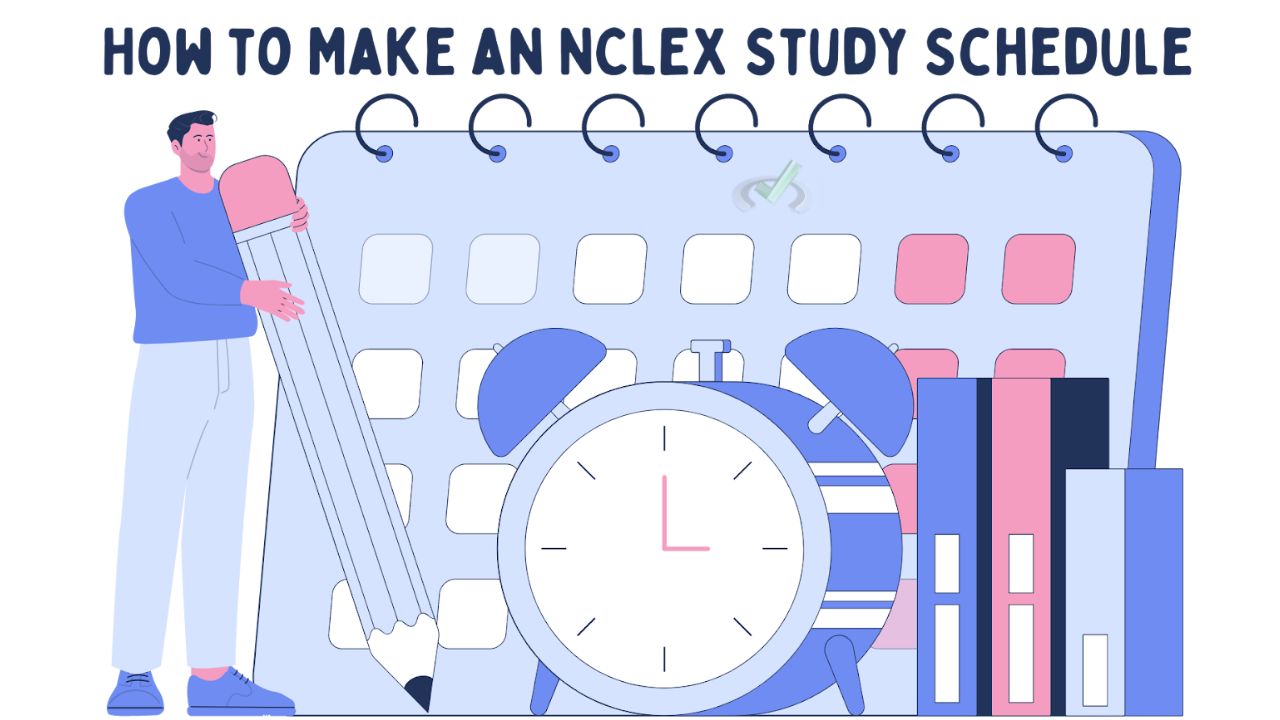
Nearly 1 in 5 first-time NCLEX test-takers fail. Yup, you read that right. Many students study hard in nursing school but miss the mark because they didn't prepare the right way.
Before you panic, don’t worry. A proper NCLEX study calendar can make all the difference. A calendar can give you an edge over this tough exam.
Cramming is not the goal of a good study routine. In order to absorb information without going crazy, it's important to split everything up into manageable chunks.
Every day, we discuss little victories that add up to enormous confidence. Together, we can create an NCLEX study plan that will help you stay composed and prepared to ace the test.
Why You Need an NCLEX Study Schedule
So why bother mapping it all out? Honestly, you could try to study whenever you have the time—but it won’t work as well. A test like the NCLEX needs some planning. It’s not like a quiz where you can just show up and wing it.
Having a study calendar keeps you focused, prevents you from burning out, and actually helps you remember more. Think about it: one day you’re crossing off “Pharmacology basics,” then it’s “Patient care priorities,” and before you know it, you’ve tackled every subject and feel totally ready.
Real-time progress will be visible to you. And let's face it, it feels great to cross something off a list.
Understanding the NCLEX and Your Study Needs
The NCLEX differs from other tests you have taken. It tests not just your memory but also your ability to think. Their goal is to test your ability to think like a nurse. Like in real life, every question forces you to deal with a scenario.
This is what to anticipate:
Assess Your Time, Lifestyle, and Learning Style
Making ensuring an NCLEX study schedule works for you is crucial. You don't necessarily need to study for ten hours a day just because someone you know did.
Thus, ask yourself the following questions:
How to Make an NCLEX Study Schedule That Works

To ace the NCLEX exam, you need a study schedule that fits your life. A plan keeps you on track and makes studying less overwhelming. Here’s how to create one that works for you.
Step 1: Determine the Date of Your Test and Make a Backward Plan
Let's begin by discussing that test date. On your calendar, phone, or wall, you can display it. Place it in a circle. Stress that. Do whatever it takes to make it feel real. Working backwards is the best method to start developing your study schedule.
Here's how you arrange it:
Step 2: Set Weekly Study Goals
Every week, have a goal. Not just, “I’ll study nursing stuff.” No.
You need goals like:
Notice how clear and specific those goals are? That’s what makes this work. Each study session has a focus, and you’ll know exactly what you’re supposed to be doing every day.
Structuring Your Daily Study Sessions

Study when your brain is at its best. If you’re a morning person, wake up and get those two hours in while the world’s stillquiet. More of a night owl? Set up shop after dinner.
The key is to pick a time and make it your study slot every day. Consistency will help your brain settle into the routine.
Mix It Up: Review, Practice, and Reflect
Whatever you do, don’t spend your whole study session just reading.
Your study time should be a mix of:
Active vs. Passive Study Techniques
The quickest way to waste study time is by sitting there rereading notes or highlighting every word in a textbook. You need to be active in your study.
Try these methods:
Staying on Track: Overcoming Study Slumps and Sticking to Your Schedule
Some days you won't feel like studying. Watching Netflix might seem better than memorizing medications and side effects.
But you don’t need motivation, you need discipline. The goal is to sit down and study even when you’re not feeling it.
Accountability and Rewards
Keeping yourself on track is easier when you’ve got someone else holding you accountable.
Try:
Adapt, Don’t Abandon
Life is messy, and things don’t always go as planned. If you fall behind, don’t throw out the whole schedule. Just shift things around. Postpone a subject until the next week or extend your daily study sessions until you get back on track. You can keep going forward without feeling guilty when you are flexible.
Conclusion: Trust the Process and Adhere to the NCLEX Study Schedule

Making a good study schedule for the NCLEX is easy. Every day, stick to a plan that works for you. You have what you need and know what to do.
When you take the NCLEX, you'll feel ready and confident. Stay consistent and focused. Keep your eyes on the test date. Every hour you study brings you closer to that license.
You've got this, one NCLEX study session at a time.
